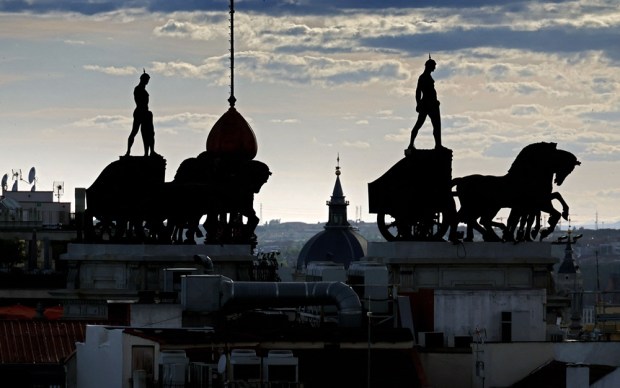Our criticism of the ABC loses its credibility if we do not praise it on those occasions when praise is deserved. So I have to say that its coverage of Anzac Day was superb. It was factual and patriotic, did not harp on how wrong we were and it was pretty much free from the anti-services, anti-war axe-grinding one usually associates with the ABC and which we saw earlier this year. The coverage of the Dawn Service and march in Melbourne, the service at Gallipoli and the very moving one at Villers-Bretonneux gave a very accurate and sober picture of what was happening and its significance. This is what most people want from the ABC and what we used to get from it. It also made me wonder if the ABC realised how this more traditional approach to programming generates such high regard and respect for the organisation. They should try it more often.
One of the interesting aspects of both Anzac Day and the royal visit was to see the ease with which the Governor-General, Sir Peter Cosgrove has fitted into his new role and how comfortable he is to its forms and processes. There was never much doubt that he was streets ahead of any other potential candidate, but his conduct and demeanour during the royal visit and the Anzac Day services were even more exemplary than one could have imagined. I also reflected on how appropriate it was that he was knighted and how easily our system of government accommodates the fact that the nation’s highest office is occupied by someone with the nation’s highest honour. Undoubtedly, having a knight as governor-general gives additional lustre to the office.
Gerard Henderson struck a chord with me the other day when he made a point about writers’ festivals, one of which always seems to be under way in one city or another as the glitterati vie with each other to show off their rival claims to guilt and shame. His point was how boring it is when the contributors make their speeches and say the same thing most of the time, no matter what the issue. There is a disappointing sameness about the speeches, almost no challenging clash of opinions and nothing outside the approved and official opinions you are allowed to have these days, unless you want to be branded as sub-human. This in turn made me reflect on how a publication like the old Nation Review was so valuable, not because I liked it, but because I did not; nor because it confirmed my prejudices but because it did not. It stirred me up, provoked me, made me think, shocked me out of simply accepting the opinions of others and made me articulate what I believed in and why.
I am going through something of the same process as I watch and rage at the American TV spy drama The Americans, set during the Cold War and based loosely on the KGB real-life spies who masqueraded for years as a typical American family until the FBI cornered them. I hate it for the treason, lying, murder and dissembling of the spies; and love it for the patriotism, loyalty and sacrifice of the spychasers that, I hope, will succeed in the end. One of the critics said it achieves the rare objective of making you cheer at the same time for the KGB and the FBI. I would put it differently, because nothing could make me cheer for the KGB. It is a great programme because it invokes a series of moral crises, as each side manoeuvres to get the upper hand that drags you from one side to the other and forces you to rethink your values and confirm your loyalties. Such a cascade of rival opinions is a far cry from the best that our intelligentsia can apparently produce with everyone at a writers’ festival tediously repeating the same clichés about their favourite so-called progressive subjects, before the audience bursts into rapturous applause.
Talking of Russians, I am as worried about the international scene today as at any time since I sat in the law library at Melbourne University on 25 October 1962 and waited for the declaration of nuclear war. The US had just gone to Defcon 2, but the Russians would not remove their nuclear missiles from Cuba and had more on the way. It is pretty clear that President Putin is rattling the same militarist can now, wants to regain the lost territory and glory of the old Soviet Union — not only Ukraine — and is prepared to engage in extreme brinkmanship to get his way. In 1962, the Russians gave in because they knew the United States had superior military force and that its president was resolute enough to use it. They certainly knew it 20 years later when President Reagan brought them to heel. Today, huffing and puffing about sanctions will not achieve much; Mr Kerry says that every inch of Nato territory is inviolable, but can you really see the West using anything remotely like force to stop the expansion of the new Russian empire? The most likely outcome is that Russia will get a good slice of Ukraine and, building on that success, start to destabilise central Europe. Then the trouble will really start.
Got something to add? Join the discussion and comment below.
Get 10 issues for just $10
Subscribe to The Spectator Australia today for the next 10 magazine issues, plus full online access, for just $10.
You might disagree with half of it, but you’ll enjoy reading all of it. Try your first month for free, then just $2 a week for the remainder of your first year.














Comments
Don't miss out
Join the conversation with other Spectator Australia readers. Subscribe to leave a comment.
SUBSCRIBEAlready a subscriber? Log in